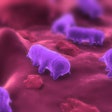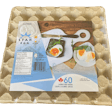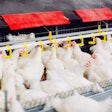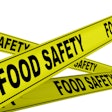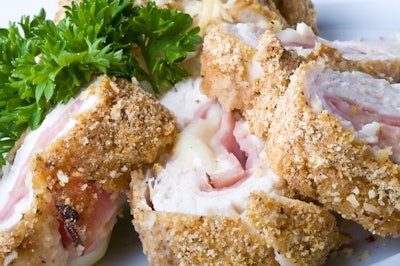
Salmonella, at some point in the future, will likely be declared an adulterant in some chicken products. This action creates questions about the future decisions of federal regulators.
In August 2022, the U.S. Department of Agriculture’s (USDA) Food Safety and Inspection Service announced it will declare Salmonella an adulterant in breaded, stuffed raw chicken products commonly sold as chicken cordon bleu or chicken kiev. The move will ensure “highly contaminated products that could make people sick are not sold to consumers,” according to the agency.
Consumers mistakenly eat these products undercooked or raw because they may appear fully cooked when purchased. Since 1998, breaded and stuffed raw chicken products were associated with more than 200 illnesses.
Salmonella policy review
The move is linked with a previously announced policy shift by the FSIS to change the way it views and regulates Salmonella. In the future, it wants to focus on virulence of pathogens rather than the total pathogen count.
FSIS Spokesman Jackson Collier said in Fall 2022, the FSIS will publish a notice in the Federal Register proposing to consider this class of products adulterated if they exceed a “very low level” of 1 colony forming unit of Salmonella per gram.
The FSIS, he said, will seek public comments on the final standard and will use input to inform its final plan and verification testing. When finalized, the agency will announce its implementation plans and the date it will begin routine testing for Salmonella.
Adulterated
Collier said the FSIS considers the adulterant announcement the first step in its larger initiative to reduce illness from Salmonella in poultry products.

If Salmonella is an adulterant in chicken cordon bleu, one might ask, then should it be an adulterant in ground chicken, ground turkey or other poultry products?(Eraxion | BigStock.com)
“FSIS will be presenting a proposed framework for a new strategy to reduce Salmonella illnesses attributable to poultry in the coming weeks, and we will convene a public meeting to discuss it in November (2022),” he said.
Legally, a product with an adulterant is considered adulterated, unfit for human consumption and therefore cannot be sold.
Industry reaction
In an August 2022 statement, Dr. Ashley Peterson, senior vice president of scientific and regulatory affairs for the National Chicken Council (NCC), acknowledged the confusion about the products potentially being ready to eat and the merits of the food safety attention.
However, the concern lies with “the precedent set by this abrupt shift in longstanding policy, made without supporting data, for a product category that has only been associated with one outbreak since 2015.”
“It has the potential to shutter processing plants, cost jobs and take safe food and convenient products off shelves,” Peterson said.
Since 1957, and the passage of the Poultry Products Inspection Act, the FSIS has never considered Salmonella on a raw poultry product an adulterant. The NCC noted the most recent outbreak in 2021 was rooted in consumers improperly cooking it to the proper internal temperature of 165° Fahrenheit.
Bob Hibbert, a senior counsel at Washington law firm Wiley Rein LLP who specializes in regulatory issues, and Bill Marler, managing partner at Marler Clark LLP PS who specializes in foodborne illness litigation, agreed the move was unexpected.
Hibbert saw the decision as inconsistent with the other initiatives the USDA is working on. Moreover, he said, the announcement creates confusion since it hasn’t yet officially done anything nor clarified how it will enforce its declaration and inspect products to meet its threshold.
E. coli and Salmonella
Marler said the issue goes back to the 1990s and a famous E. coli outbreak in Jack in the Box hamburgers that ultimately led to a certain strain – E. coli O157:H7 – being labeled an adulterant in 1994. That decision shifted the food safety burden from the consumer cooking the product to the beef processors and resulted in a major decrease in illnesses, he said.
Hibbert said Marler Clark is an active participant in the federal food safety conversation. It’s among a group of other petitioners who ask federal agencies to name numerous strains of Salmonella an adulterant in poultry.
Recently, the FSIS responded to those petitions and said it wouldn’t do that. Chicken products are not subject to widespread undercooking like beef burgers and steaks. E. coli strains carry a low infectious dose combined with a high level of lethality. It did leave the door open by saying it would continue to investigate the issue.
Looking ahead
When the adulterant decision will carry the weight of law remains uncertain. It must first complete the lengthy federal rule making process and will be subject to court review afterward.
“It's not necessarily a done deal, so to speak,” Marler said. “It could be that they change their mind or decide not to do it. I think they have the science behind them to continue.”
Hibbert and Marler said the manufacturers of these products are most likely to be affected as they will likely need to reformulate it as a cooked product and modify their supply chain accordingly. It will also have ripple effects, potentially, upstream in the supply chain.
“I would hope that the fact that the USDA is taking this step would make the industry sort of rethink how they handle Salmonella and other foodborne pathogens in raw product,” Marler said. “I think it could be a potentially really impactful, positive thing for the industry.”
Industry takeaways
The USDA adulterant declaration lacks teeth currently but it remains concerning because it’s a reminder the Salmonella issue is not going away anytime soon.
Hibbert said the announcement shows Salmonella is clearly under scrutiny. Other regulatory issues surrounding the live and processing sides of the poultry industry demonstrate that the industry is under a microscope in Washington.
Marler said he believes this one action, when completed, logically compels scrutiny of other chicken products. If Salmonella is an adulterant in chicken cordon bleu, one might ask, then should it be an adulterant in ground chicken, ground turkey or other poultry products?
From a public health standpoint, he said, the moves to limit the amount of Salmonella in products will always make the products safer for human consumption.










